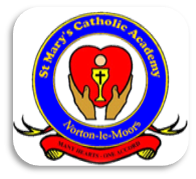Music
Intent
Music is a constant accompaniment to our lives, with access to digital music at the touch of our fingertips. Music can motivate and comfort us, inspire us in our thinking and reflect images and moods. It is our aim at St Mary’s to explore the journey of musical communication; from a fleeting idea in the mind of a composer, through the precise and accurate organisation of sounds and instruments, to an expressive performance moment and appreciation by an audience. In doing this, children should develop a sense of place in musical history, know that music contributes to important occasions both in their own lives and in other cultures around the world. Children have many opportunities to develop their own composition, performance, listening and appraisal skills. Music at St Mary’s is a joyful experience and it is our intention that our children’s learning of music remains a skill for life.
Implementation
Music lessons at St Mary’s engage and inspire pupils to develop both a love of music and their talent as musicians. Children increase their self-confidence, creativity and personal sense of achievement. The curriculum is coherently and cohesively planned by a specialist music teacher within a collegiate curriculum framework and draws on a range of published resources. The vast majority of lessons are practical learning activities.
In Key stage 1, the children are taught to use their voices expressively and creatively by singing songs and speaking chants and rhymes. They play tuned and untuned instruments musically, following a conductor’s instructions. They explore the inter-related dimensions of music and listen with concentration and understanding to a range of high-quality live and recorded music. Composition tasks give them the opportunity to experiment with creating, selecting and combining sounds to imitate and communicate a particular creative idea. Basic rhythm notation is introduced and used in composition and performance tasks.
Key stage 2 pupils are taught to sing and play musically with increasing confidence, accuracy, fluency and expression. Class instrumental performance pieces are presented on the recorder (year 3) and ukulele (year 5), using both staff notation and tablature. In year 4, all children are given large group first access tuition on a string, brass or woodwind instrument of choice and are encouraged to continue learning and support the school orchestra in the following years. For musical improvisation and composition tasks, children also have access to a wide variety of tuned and untuned percussion and are encouraged to use their own instruments. The learning of musical history is introduced through the use of the ABRSM “100 Pieces” collection for listening and the BBC Ten Pieces initiative which weave together critical listening, cultural and historical awareness and practical performance and compositions tasks. In year 6, the curriculum context shifts to popular and commercial styles, looking at the trans-Atlantic influences of the 20th century. Practical activities focus on developing ensemble skills on various instruments, using knowledge and skills built up in previous years.
Music is also present across the curriculum supporting learning in areas such as maths, languages and dance. Songs are used to reinforce new learning of vocabulary in a range of subjects and are also an important part of our collective acts of worship. As a Catholic Academy, we use music for listening and singing in our masses and assemblies, spreading the gospel message.
Music is important in the wider life of the school, increasing children’s confidence in whole class and key stage performances such as the Christmas Nativities and the Summer Concerts. Extra-curricular musical activities provide even wider performance experiences across the collegiate and in the community including Songbirds, choir, orchestra, peripatetic lessons and other musical clubs such as recorders, ukuleles and music technology.
Impact
Music has a high profile in our school community. Our school is full of singing and there is a high level of instrumental learning beyond the curriculum provision. Our performances foster parental engagement and support. All teachers are encouraged to lead and support cross-curricular musical activities. Participation in music develops wellbeing, promotes listening and develops concentration which have an impact beyond music lessons. We want to ensure that music is loved by adults and children across the school community, encouraging them to continue building on this wealth of musical ability, now and in the future.
We know our children have progressed in music when:
- They can make connections between the music they have heard and their own life experiences and learning in other subjects
- They are confidently performing in front of their peers
- They are able to teach themselves or friends a new piece of music independently.
- They can organise sounds for a purpose, in a structure, communicating ideas effectively.
